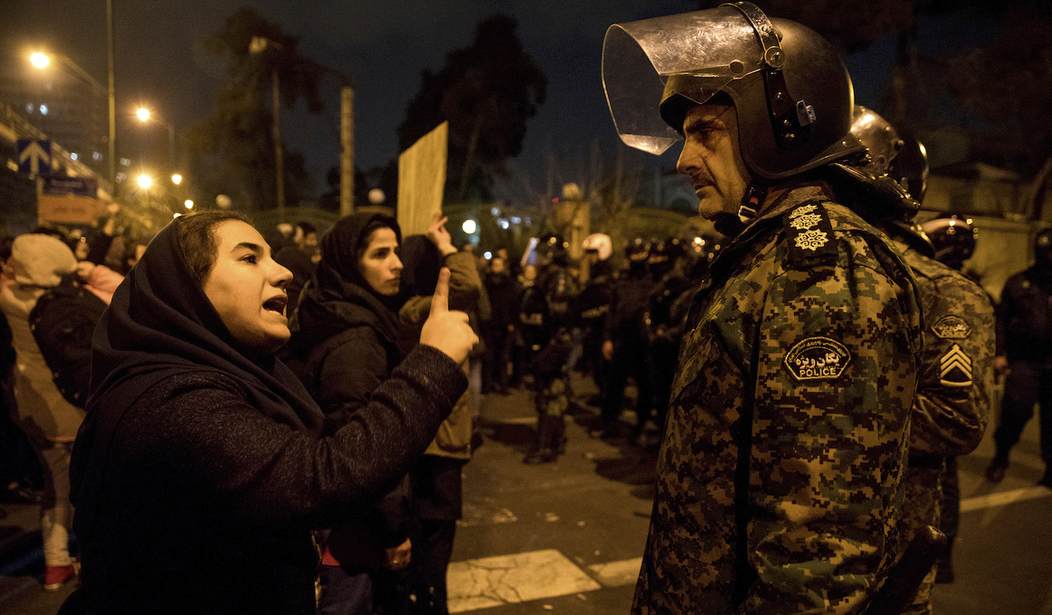In case you haven’t marked it on your calendar, Friday is Quds Day—Iran’s annual day for holding regime-arranged anti-Israel rallies, trampling U.S. and Israeli flags, and swearing that Quds—Jerusalem—will be “liberated” and its Israeli “occupiers” removed from the scene.
Advertisement
This year, as Iran struggles with its COVID-19 crisis, will see a more subdued Quds Day that reportedly will be limited to prayers and commemorations in mosques in what are considered low-risk areas.
Meanwhile, even as Iran reels from ever-intensifying U.S. sanctions and plunging oil prices along with its COVID-19 travails, this week its cyberwar with Israel made the Washington Post and the New York Times and may only be heating up.
On Tuesday the Post reported on an Israeli cyberattack against Iran’s Shahid Rajaee port back on May 9. It caused, the paper said, “massive backups on waterways and roads leading to the facility.”
The Post said it got the lowdown on this attack from “U.S. and foreign government officials.” Israeli analysts see this as indicating that Israel—via the U.S. or in tandem with it—wanted to send a clear, public message to Tehran about its cyber capabilities and readiness to use them.
That message, in turn, was made necessary by an Iranian cyberattack on Israel’s water infrastructure on April 24. Although it was foiled and caused no more than slight, temporary damage, Israeli officials were reportedly “aghast” at Iran’s brazenness in crossing a red line.
As one Israeli commentator pointed out, an attack on vital civilian infrastructure could cause “thousands more casualties and material damage than kinetic bomb damage.” Another Israeli commentator said the Iranian cyberstrike “could have been an attempt to add chemicals to Israel’s water supply, or a biological attack.”
Advertisement
In cyberstriking the Iranian port, Israel was not trying to inflict casualties or spark a war with a regime that, in any case, is tottering, but to remind Tehran that it is much better at the cyber game and not worth tangling with.
Related: Israel Is Finally Driving Iran Out of Syria
As the New York Times put it on Wednesday, the “attack on the computer systems at the Shahid Rajaee port…was limited in scope, creating traffic jams of delivery trucks and some delays in shipments, but causing no substantial or lasting damage.”
The Israeli strike, in other words, was a success and achieved—at least on the technical level—its goal. In contrast, the Times says, Iran’s attempted “attack [on Israel] and its quality were described by intelligence official [sic] as miserable.”
The upshot is that Israel won this round with a calibrated warning. Does that mean Iran will be rational enough to heed the warning and desist from the game? Israel, of course, isn’t foolish enough to make that assumption.
The Times: “An intelligence official said that Israel hopes the attack on the port will end this cyber exchange, but that according to one intelligence assessment, [Iran’s] Revolutionary Guards will respond by attacking Israel again.”
Israel is indeed “preparing for a potential Iranian or Iran-linked cyberattack in response” to its attack on the port, and its “security officials [have] instructed agencies and sensitive facilities to raise their…preparedness for…a retaliatory cyberattack as part of an apparent new tit-for-tat war.”
Advertisement
Seemingly, amid its severe troubles, a war of that kind with a superior cyber-foe is not what Iran needs at this point. But considering that the regime has always put the welfare of its population second to its goals of “exporting the revolution” and destroying perceived “satanic” entities, its rationality is nothing to count on.
Tehran is also hoping—not unreasonably—that the U.S. elections in November will give it a reprieve. If he wins, will Joe Biden—at least—think seriously about whether he wants to hand it that reprieve, easing the sanctions and freeing billions more dollars for the regime and its endeavors?
_______
P. David Hornik, a longtime American immigrant in Israel, is a freelance writer, translator, and copyeditor living in Beersheva. In addition to PJ Media his work has appeared in FrontPage Magazine, National Review, New English Review, American Spectator, American Thinker, The Times of Israel, the Jerusalem Post, and elsewhere. Among his books are Choosing Life in Israel and the novel Beside the Still Waters, which was published by Adelaide Books in 2019.









Join the conversation as a VIP Member